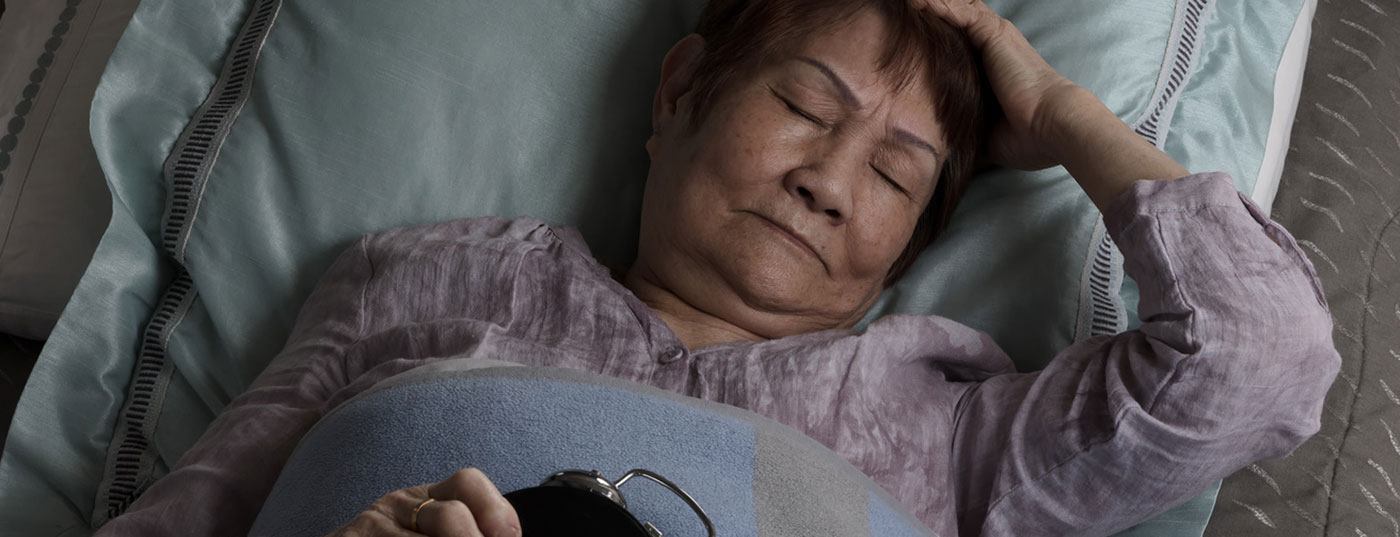Sleep disorders in old age can manifest in a cause-effect-cause spiral: Depression, cognitive disorders or dementia may correlate with sleep disorders. Dr. med. Roland Kunz, Zurich, explained these relationships, clarified the need for sleep in old age and gave recommendations for dealing with sleep disorders in old age.
Sleep problems reveal themselves in older patients via complaints that they wake up too early in the morning or feel unrested. Elderly patients with sleep disorders tend to have increased morbidity; for example, poor sleep quality can lead to cognitive impairment or depression. Patients also frequently complain of reduced performance. Sleep disturbances can even produce pseudodementia. As a result, there is a social withdrawal and thus isolation within one’s own four walls – which in turn can lead to a shifted sleep rhythm.
Patients usually cite frequent waking or/and lying awake for long periods as sleep disturbances, Kunz said. However, these can also be attributed to physiological changes in old age: Deep sleep phases decrease with age – from around 70 years of age, this settles at a lower level. REM sleep phases decrease. This results in the effective reduction of sleep duration in later years of life.
Typical sleep in old age is interrupted by periods of wakefulness. The reasons for this are still partly unknown. There are certain endocrine changes in which melatonin and cortisol play a role. In a young person, the melatonin peak is higher during sleep than in an old person. And a low level of cortisol also corresponds with a high peak of growth hormone, while this is reversed in the elderly. These endocrine factors are likely to influence sleep architecture in the elderly.
Other causes of sleep disorders are also related to the changed life situation of elderly people and are manifold: These include, for example, sensory impoverishment or loneliness due to losses. When performance drops, it affects self-esteem, you no longer feel useful. Concerns of a financial nature should also not be underestimated, according to the speaker’s experience. Brooding and even depression can result. Vegetative signs from this stress also interfere – for example, the typical cold feet. Declining physical and mental performance in itself can also be a stressor. The inability to deal at all with the newly gained time after retirement leads at the same time to longer bedtimes (with less need for sleep).
The influence of comorbidities and medications
Lack of deep sleep causes pain sensation to increase. Neuropathic pain, which is typically pain at rest, manifests as tingling or itching. Depression interacts with sleep disorders: Sleep disorders are symptoms of depression; on the other hand, patients with sleep disorders are prone to develop depression. Depression screening is recommended here.
Sleep disturbances can also be an early sign of dementia, while conversely, sleep disturbances can reduce cognitive abilities. In the context of interactions, benzodiazepines as sleep aids may also reduce cognitive abilities.
Parkinson’s disease and Lewy body dementia patients are significantly more likely to show behavioral disturbances during sleep, e.g., they talk, laugh, gesticulate. In the process, these patients also fall out of bed from time to time. Obstructive sleep apnea syndrome increases in frequency with age, exacerbated by alcohol, opiates, and benzodiazepines (risk of IUD). Restless legs syndrome is very common among other comorbidities, as are COPD, heart failure, reflux – somatic problems – and incontinence problems.
Medications, caffeine and alcohol can contribute to a decrease in sleep quality. For example, SSRIs commonly prescribed for depression reduce REM times. Furthermore, diuretics interfere with the feeling of a full bladder, beta-blockers suppress melatonin secretion. Corticosteroids and anticonvulsants complete this list.
Clarification and treatment
In the anamnesis conversation, one should clarify the question of whether the problem is the patient’s or the relatives’. The duration of the disturbances and the presence of unusual events must be examined, and an orientation to life rhythms, sleep habits, and medication use is necessary. Comorbidities should be excluded. A sleep protocol supports the analysis of the initial situation. If no comorbidities are present, the speaker recommends nonpharmacologic treatment (see box) over pharmacologic treatment.
When it comes to pharmacological treatment, it makes sense to work with sedating antidepressants in aging patients (see box), Kunz said. Trazodone (Trittico®), mirtazapine®, and misanerin (Tolvon®) are proven substances that do not carry the high risk of falls associated with classic sleep medications. Kunz is rather skeptical about melatonin, saying that the evidence is relatively poor: about every second patient shows a slight improvement in sleep quality.
The classics zolpidem, zoplicone (Imovane®) are quasi “blockbusters”, the risk of falling is not as high with these substances as with the benzodiazepines, but it is increased. The risk of dependence is not so pronounced. The same is true for dementia patients.
Neuroleptics are not sleep aids; they are to be used specifically for psychotic accompanying symptoms and behavioral disorders with an appropriate level of distress, but not as routine sleep aids.

Conclusion
In the nonpharmacologic management of sleep disorders, it is helpful to involve family members, for example, with evening walks together and other routines before going to sleep. Bedtime should be adjusted to the reduced need for sleep. Pharmacological-based intervention should not be the first choice, but clarification, counseling, and inducing behavior change.
Source: 1st SWICA Symposium: Sleep Disorders and Health on 1 February 2018, Bern. Lecture: Sleep disorders in old age; speaker: Roland Kunz, MD, Zurich.
HAUSARZT PRAXIS 2018; 13(4): 40-42











